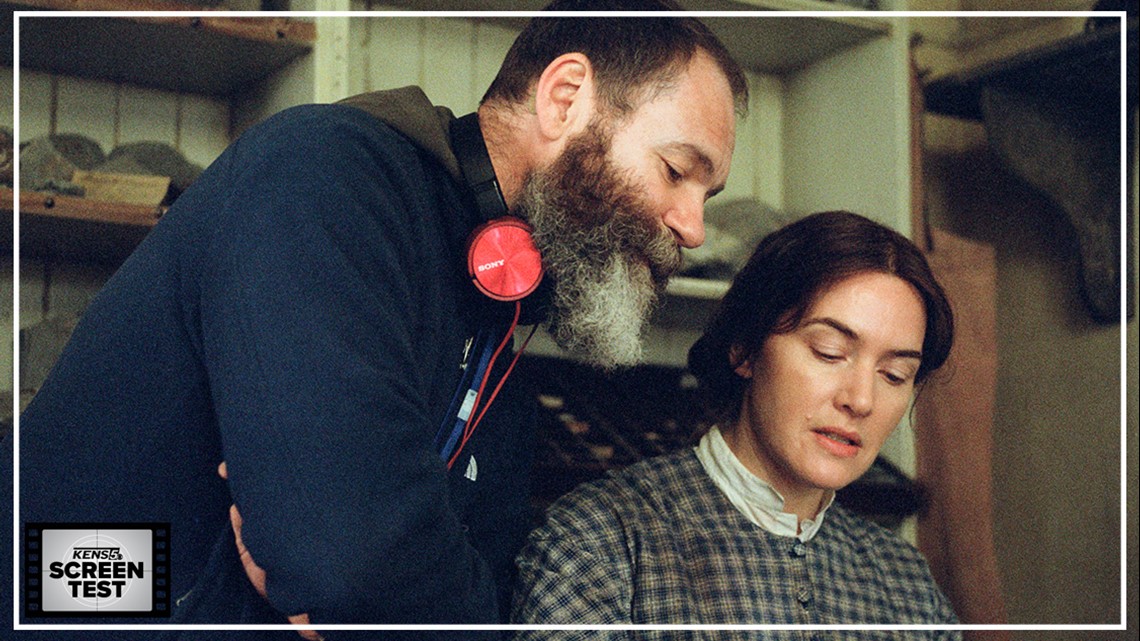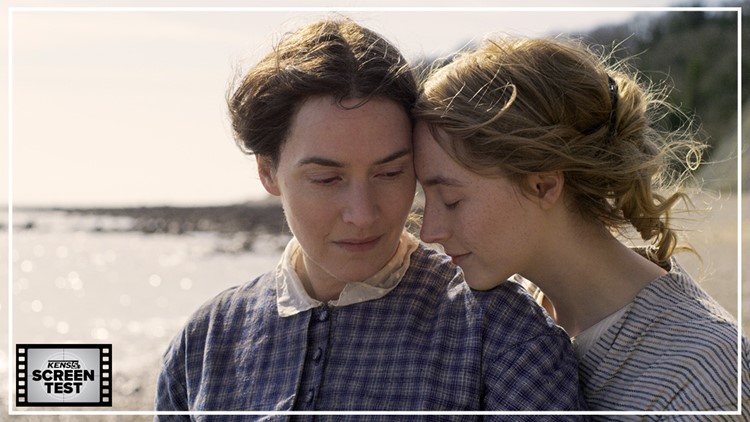[[Note: When "Ammonite" releases in the U.S., it will largely be at indoor movie theaters during the ongoing coronavirus pandemic. While the purpose of this review goes deeper than binary recommendation to discuss the film's merits as an artistic work in context of its time, we encourage our readers to continue exercising the latest safety guidelines from health authorities and consider them if and when you may decide to visit the cinema to watch this movie.]]
At first glance, Francis Lee’s “Ammonite” represents the other side of the love story coin that the British filmmaker first flipped in his tender 2017 film, “God’s Own Country.” Both concern aloof protagonists who toil away at routine labor in unforgivingly chilly environments, and who are split open by inner hunger awoken by a same-sex visitor. The incoming conversation surrounding this week’s release of “Ammonite” (as well as its inevitable awards season run from indie powerhouse and “Parasite” promoter Neon) is certain to be dominated by the parallels of Lee’s first two features.
But look closer, especially while absorbing an excellent Kate Winslet performance and Lee’s complicated interplay of youth and experience, and you observe that the finely directed “Ammonite” resists comparison to its predecessor as much as it demands them. Whereas “God’s Own Country” showed that desire is a spectrum, “Ammonite” proves expectation is as well—and it can roil desire from a still ocean into a thunderous abyss.
Armed with a guarded and time-honed defiance, Winslet plays Mary Anning, the real-life English paleontologist who (if you’ll indulge a brief history lesson in this review) played a crucial role in developing our modern understanding about the age of the dinosaurs; though, true to form for the male-dominated scientific spheres of the 1800s, that role has come to be only retroactively appreciated to a fuller extent than it ever was while Anning was alive. While a male colleague’s declaration of Mary’s “legendary skills” hint at the reputation she had carved out, her picking apart of beachside discoveries in a simple workspace with simple tools is enough to suggest that her richness was relegated to her genius, and not in literal wealth. In “Ammonite,” Winslet’s Mary lives with her mother and approaches her work with a passion that feels more like stone-hearted dutifulness, as if scouring shell-covered shores and digging her fingers into mud to release small boulders is all she’s ever meant to do, despite how frostily it’s depicted. The cinematographer here is “Jackie” alumnus Stéphane Fontaine, and his commitment to harsh environments dominated by blacks, blackish-blues and faded yellows indicates Mary’s bruised history with love as much as it will make you want a hot chocolate.
It’s interesting, and vital to understanding Lee’s intentions, that the film doesn’t position itself as a biopic. I don’t recall any of the date cues or location cards that are inherent requirements for that overworn genre, and the writer-director’s recognition of Anning’s scientific contributions is most explicit in an opening scene whose connection to Winslet’s researcher depends largely on your own knowledge of history. Instead, Lee looks to Charlotte Murchison’s position in Anning’s life (by all historical accounts, it was nothing more than a strong friendship) as foundation for fictional romance, although that word’s swooning connotations are much too sweet-toothed for how it’s manifested here. Played by the indomitable Saoirse Ronan, Charlotte is the quiet and wary wife to an enthusiastic admirer of Mary’s who drops by one day to observe her at work. She reluctantly agrees (following the offer of payment) although it isn’t long after that Lee’s screenplay curiously drops Roderick Murchison (James McArdle) from the proceedings; he must travel, but Charlotte has a touch of “mild melancholia” and is thus left in the care of the Annings—to rest and accompany Mary, but also to learn and, eventually, infatuate.
If “Ammonite” isn’t a conventionally busy biopic, it isn’t meant to be the steamiest of love stories either; an unhurried pacing sees to that, as does Winslet’s marvelously understated performance. Putting in some of her most commanding on-screen work since she received an Oscar nomination for 2015’s “Steve Jobs,” Winslet translates a past life of disappointment tinged with regret – or perhaps it’s the other way around – in a single solitary, forlorn glance. And it’s in the minute shifts of that demeanor that we start to suspect Charlotte’s presence is chipping away at a hardened exterior, like a paleontologist searching for evidence of life. “What is it?” Ronan’s younger geologist-in-training asks after stumbling on a potential find. “Something...nothing,” Mary answers, with a rare flicker of doubt. Her companion responds with deceptive obviousness: “Shouldn’t you excavate it?”
It isn’t until late – very late – in “Ammonite” that the fullness of Lee’s storytelling intentions bear thematic fruit in a haunting conclusion. Until that point, the straightforwardness of his screenplay allows the drama to make an absurdly simple but nonetheless effective central metaphor out of Mary’s daily work of getting her hand dirty, blistered, chapped and chalky. Romance in “Ammonite” isn’t a liberating spark so much as a careful wade into the high tide, but Winslet provides enough hint of a deeply internalized (dare we say “fossilized”) potential to open herself up that we can overlook the moments that Lee overwrites his story to invest in the inevitable question: Could this possibly last?


It isn’t until Fiona Shaw’s Elizabeth Philpot briefly enters the picture that we begin to understand how actively Mary is burrowing a past whose details Lee is otherwise just fine not digging up. Ronan, meanwhile, in a funny bit of casting against type, isn’t the lionhearted individual that occupies her recent movies, specifically her collaborations with Greta Gerwig. In “Ammonite” the actress is morose and downtrodden, and at one point she meanders through the streets while wearing what is easily implied to be a widow’s black mourning garb—an early hint, perhaps, at the distance she feels in her own marriage following the loss of a child.
An emotional aloofness lingers under every interaction in “Ammonite” (save for when the two women fully give in to mutual feelings under the veil of night), and it gets very close to overplaying its hand. Mary and Charlotte’s newfound relationship is somewhat at a remove from their immediate context as much as it is fueled by their shared connection to the natural world; intimacy scraped from geology, if you will. But it isn’t without purpose, and it’s worth noting that the movie’s engine of a metaphor is for audience as much as it is for character—we, too, are encouraged to excavate a belief that warmth could glow brighter than a candle’s flicker between these two women, and that Mary, in particular, can shed a shell that Winslet projects with such ease.
It’s in this crevice that another similarity with “God’s Own Country” emerges: “Ammonite” is not about the particulars of yearning so much as what yearning does to a person who believes themself to be beyond the capacity to turn yearning into long-term commitment. In that respect, Lee’s first two features don’t just feel like companion pieces; they almost represent two-thirds of an earthy trilogy about excitement and restraint, vulnerability and pain, blindness and steeliness. It’s tempting to think the implications of “Ammonite” – a movie that progresses at an unassuming gait before ending in an urgently devastating manner – may be more satisfying to ponder than to watch unfold. But at that point we’ve only tricked ourselves into believing that the looming storm clouds on the horizon, and in the excellent final scenes of Lee’s movie, could never be enough to wash away the progress of discovering all that’s been unearthed.
“Ammonite” is rated R for graphic sexuality, some graphic nudity and brief language. It’s now playing in select theaters.
Starring: Kate Winslet, Saoirse Ronan, Fiona Shaw, Gemma Jones
Directed by Francis Lee
2020
OTHER SCREEN TEST REVIEWS
- ‘The Climb’ Review: An unconventional bromance stings with its comedy, languishes in its drama
- ‘Let Him Go’ Review: A multi-toned neo-Western that veers between soulfulness and explosiveness
- ‘Kindred’ Review: A finely crafted, vaguely familiar thriller that would make Edgar Allen Poe proud
- ‘Come Play’ Review: Techno-boogeyman thriller offers routine scares, roughly drawn sentimentality
- ‘Holidate’ Review: Emma Roberts, Luke Bracey star in Netflix’s sardonic attempt at subverting Hallmark Channel sentimentality
- ‘On the Rocks’ Review: Sofia Coppola’s familial drama finds casual tenderness in fractured connections
- 'The Witches' Review: Robert Zemeckis's redundant update of Roald Dahl's fantasy belongs on the back of a cereal box
- ‘Time’ Review: One of 2020’s greatest documentaries is a vivid portrait of emotional endurance and mass incarceration’s specters
- ‘The Trial of the Chicago 7’ Review: A stellar cast boosts Aaron Sorkin’s simplified courtroom epic



